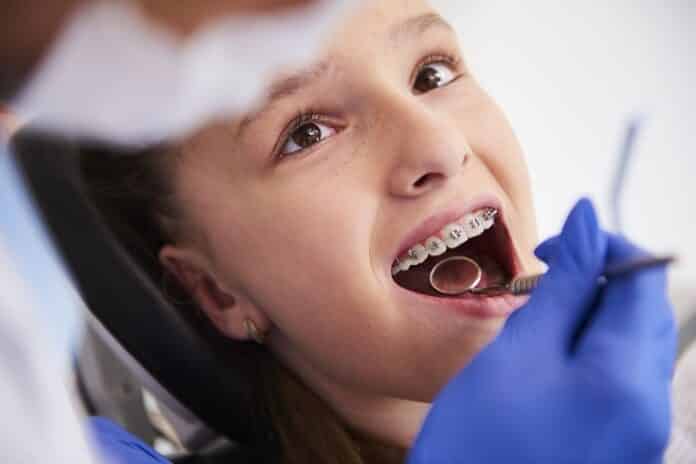If you’re about to get braces or got them recently and are struggling, chances are, your oral hygiene will suffer.
But this isn’t a given and can be stopped with the right advice and a can-do attitude!
So, read on to find out how you can maintain your oral hygiene.
Can braces cause problems with oral hygiene?
A commonly reported problem with braces is the impact they can have on good oral hygiene routines – which as we all know, is an essential step in keeping your teeth healthy, strong, and white.
But why exactly do braces affect mouth health?
Increased risk of plaque
Most traditional braces use brackets, that are attached directly to the tooth’s surface, joined by an archwire that runs for the entire upper or lower arch.
This gives you additional ridges and surfaces that can hide plaque and encourage its development.
If left, this plaque can cause cavities (holes in the teeth and gums where harmful bacteria hide) and gum disease – sometimes called periodontal disease.
In worst cases, this can result in colour change, loose teeth, and even tooth loss.
It’s harder to brush – and routines need to change
Because of the components of braces, it can be quite an adjustment when brushing your teeth after your brace has been fitted!
This is because:
- You’ve probably brushed your teeth on autopilot for a decade or more and now you can’t complete the same actions.
- You will likely need to learn to use completely different tools and brush differently – which can take a little bit of time to get used to.
However, acknowledging this and tackling it head-on is the easiest and simplest way to overcome these challenges – and will also ensure you do everything you can to remove harmful plaque before it can impact your health.
You can also:
- Print brushing instructions off and leave them in the bathroom – this can jog your memory while you are learning your new brushing routine.
- Leave new tools out so you remember to use them all – preferably in the order of use to save confusion.
- Pack tools for on-the-go into your most used bags straight away – then you can’t forget them!
How to maintain your oral hygiene with braces
Keeping your teeth sparkling clean when you have braces is best considered in three key stages, two of which relate to the act of cleaning, and one which considers lifestyle changes.
While it can feel a bit unnatural at first, you can expect to pick up a new habit in around 66 days – on average – so the confusion won’t last forever.
Stage 1: Brushing with braces
No matter what your previous brushing regime included, when you have braces you should:
- Opt for a soft-bristled brush with a small head
Most people automatically buy and brush with a medium or firm brush, which can cause damage to the brace components.
If you have braces, ensure you choose a soft-bristled brush – they clean just as effectively and don’t damage your braces.
The smaller head also means you will be able to reach around the wires and brackets, removing all the plaque and food residue.
- Brush at 45 degrees
Unless told otherwise, people tend to hold a toothbrush perfectly flat to the teeth (at about 90 degrees).
However, holding the brush at a 45-degree angle is much more effective and gentler, circular motions can dislodge nasties without exposing the gums to too much pressure – which can irritate and damage them.
This should also mean you can reach up and under the brackets, wires, and bands, stopping you from missing bits.
- Brush more regularly
Most people brush twice a day and this is perfectly sufficient.
However, if you have braces, there is an increased risk of food particles becoming trapped, so you should aim to brush after every meal.
If this isn’t possible, try to rinse the mouth as soon as possible with water to dislodge them and reduce the risk of plaque build-up.
Stage 2: Flossing with braces
With a few swaps, flossing with braces can go from awkward to a piece of cake.
- Swap tape floss for floss threaders
Though perfect for most, tape floss can be hard to manoeuvre around brackets and wires if you have braces.
Instead, switching to floss threaders means you will be able to clean between wires and brackets without the struggle.
Commonly supplied with instructions on the back of the packet, they can take a little while to get used to them – so try and keep these instructions until you are more confident.
- Add interdental brushes
Interdental brushes can look a lot like mini mascara spoolies, but they are definitely designed to clean between teeth instead of giving you luscious lashes.
They aim to complement flossing by cleaning the sides of teeth and other areas that floss might not reach, which are often missed with braces.
Interdental brushes come in a range of sizes, so before you leave your dental office, be sure to ask a professional which would suit you best.
Stage 3: Lifestyle changes with braces
As well as maintaining your dental hygiene by brushing and flossing, there are a few lifestyle changes that you should implement to keep your oral health in check.
This includes:
- Avoiding food and drinks that are sugary or sticky
Sweets, including chewy caramels and fudges, full-sugar fizzy drinks, and chocolate can all adhere to the braces more than healthier foods, increasing the risks of cavities.
- Limiting acidic drinks
Although considered healthy, some fruit juices and fruit-based fizzy drinks can weaken tooth enamel, so it’s best to limit these to once a day, with a meal.
- Drinking more water
Essential for overall health and good for rinsing the mouth, water is the best option for all-day drinks.
- Visiting the dentist regularly
As well as appointments with your orthodontist in Hammersmith, you should still attend appointments with your dentist.
This allows your dentist in Putney to ensure your oral health isn’t worsening and allows them to schedule regular professional cleanings if you need them.
Following this advice will ensure your oral health doesn’t deteriorate and your orthodontic treatment is as effective as possible – so, good luck!





